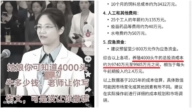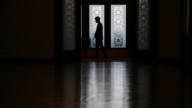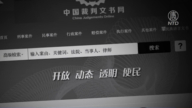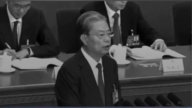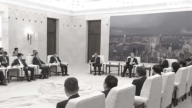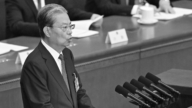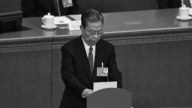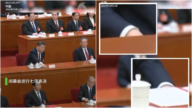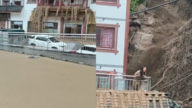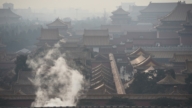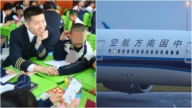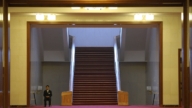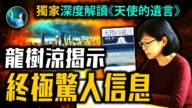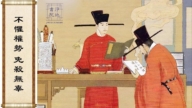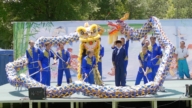【新唐人2012年3月17日讯】3月14号在北京人民大会堂举行的记者会,中共总理温家宝跟中外记者见面,并回答他们的提问。三个小时的记者会上,温家宝回答了16位记者的提问,其中谈论政改与王立军案时,两次提及否定文革左倾错误,温家宝罕见的严厉批评了现任重庆当局,并誓言要严格办案。学者认为,这显示︰中共已经在全世界面前当众分裂了。
王立军事件在中国闹得沸沸扬扬,就在中共总理温家宝在北京的两会记者会上的隔天,薄熙来与王立军两人遭到迅速免职,令外界感到好奇。
温家宝在记者会上提出,如果政治改革停步不前,文革的悲剧就有可能重演。
大陆资深记者铁流:“这个问题,谈总比不谈好,温家宝一直在谈这个问题,这个基调不是他个人的基调,包括胡锦涛,包括李克强,包括习近平,他们可能事先取得一致的口径,昨天(15日)绝对是一个整体行动。”
薄熙来立场左倾,唱红打黑的形象鲜明,跟中共高层所谓的改革开放路线抵触。
铁流分析,薄熙来在“两会”后下台,应该是中共高层的共识。薄熙来主政重庆以来,推行“唱红打黑”,受中国左派人士热烈追捧。不少人认为“唱红”是肯定和怀念“文革”,甚至有重走“文革”左倾路线的意图,但是薄熙来太过招摇,让领导层感觉非常不舒服。
美国“乔治梅森大学”教授章天亮表示,温家宝将薄熙来定位为文革余孽,在记者会上回应王立军事件时,主动提到“十一届三中全会”和“路线”之争。温家宝的这番回答,可以说是中共最高层在王立军事件和薄熙来去向问题上的正式表态。
“美国乔治梅森大学”教授章天亮:“3月9号薄熙来讲的,和3月14号温家宝讲的是完全不一样,而且温家宝一定要讲他这样的话,宁可拖了三个多小时,也要把他的话讲出来,所谓改革都是表面的东西,他真正想讲的是薄熙来的问题。”
章天亮还表示,温家宝的最新谈话,代表了中共最高层对薄熙来在重庆“唱红”的否定,也从整体上表达了对党内外左倾势力的批评。
美国乔治梅森大学教授章天亮:“最大的一个看点是温家宝公开的借着谈文革的话题,把薄熙来讲的这一套划为文革余孽,这样的话,我想薄熙来的政治前途是完蛋了,但是我估计薄熙来还是要垂死挣扎,双方肯定会有很多的摊牌或者是较量。”
在中共中央政治局常委周永康高调肯定重庆一周以后,温家宝就公开严厉的批评了重庆,随即,薄熙来被免职,中共内部各种势力围绕着薄熙来还会有怎样的进一步动作呢?有消息指出,薄熙来下台后,可能被要求移居北京或老家山西,方便中共中央就近监管。
新唐人记者朱善智、黄亿美、郭敬报导。
Premier Wen Jiabao Calls for Reforms, Criticises Chongqing
On March 14th, Premier Wen Jiaobao answered questions in a press conference at the Great Hall of the People in Beijing. During the three-hour conference, Wen answered questions from 16 reporters. Wen talked about political reforms, the Wang Lijun incident, and refuted the Cultural Revolution’s extreme leftist mistakes. Wen heavily critcised the current group of Chongqing
authorities, and vowed to launch a thorough investigation. Scholars said that Wen’s remarks indicate that the Chinese Communist Party (CCP) has publicized its internal separation.
The Wang Lijun incident has ignited hubbub in China. The day after Premier Wen’s talk during the press
conference in Beijing, Bo Xilai and Wang Lijun were removed
immediately, surprising the outside world.
Wen commented that without the success of political
reforms, a historical tragedy like the Cultural Revolution may occur again.
Tie Liu (senior reporter in China), “It is better than saying nothing.
Wen has continuously talked about this issue.
This is not his personal opinion, Hu Jitao, Li Keqian
and Qi Jinping all may have agreed upon it prior. Yesterday’s action (March 15th) is definitely a unified move.”
Bo Xilai’s left stance on the “Red Songs” (Maoist era songs
that praise the Communist Party that are meant to be sung
by the masses) and anti-mafia campaign, opposed the
so-called reforms of high-level authorities.
Tie Liu analysed that Bo was removed after the two sessions
(high-level internal meetings), this should be high-level’s consensus. When Bo was in charge of Chongqing city, he launched a Red Songs and Anti-corruption campaign. It was warmly supported by left groups.
Many believe “Red Songs” are acknowledging
and commemorating the Cultural Revolution, plus an attempt to repeat Cultural Revolution ideals. Due to Bo’s flamboyant manners however, high-level leadership
grew very uncomfortable.
Prof. Zhang Tianliang of George Mason Univ. in the US, said,
“Wen singled Bo out as remnants from the Cultural Revolution.
He mentioned the Third Plenary Session of the Eleventh
Central Committee and “struggle between two lines”
(leftist and rightist) when discussing Wang’s case.
Wen’s talks can be seen as an official announcement
from the CCP top level regarding Wang and Bo.
Prof. Zhang Tianliang (George Mason University, USA),
“What Bo said on Mar. 9th differs from Wen’s speech on Mar. 14th.
It seems that Wen was determined to do so, so he extended
the conference for 3 hours.
What he really wanted to say was Bo is the issue,
not the reforms.”
Zhang Tianliang remarked that Wen’s lastest speech
represents CCP high-level’s negation of Bo’s “Red Songs” in Chongqing,
and also criticized the leftist forces of CCP.
Prof. Zhang Tianliang (George Mason University, USA),
“Wen openly discussing the topic of the Cultural Revolution
was the highlight.
He classified Bo’s behaviours as being from the
Culture Revolution movement.
I think Bo’s political era is finished, and I’m guessing
Bo will have a final struggle.
There will be showdown between both sides.”
Wen criticized Bo in public one week after Zhou Yongkang,
a member of the Politburo Standing Committee, who supported Bo.
Later, Bo was removed from his post.
However, what will be the next move by the CCP’s
different factions in dealing with Bo?
Sources reported that after Bo’s removal, he may be
required to move to Beijing or his hometown of Shanxi for surveillance.


